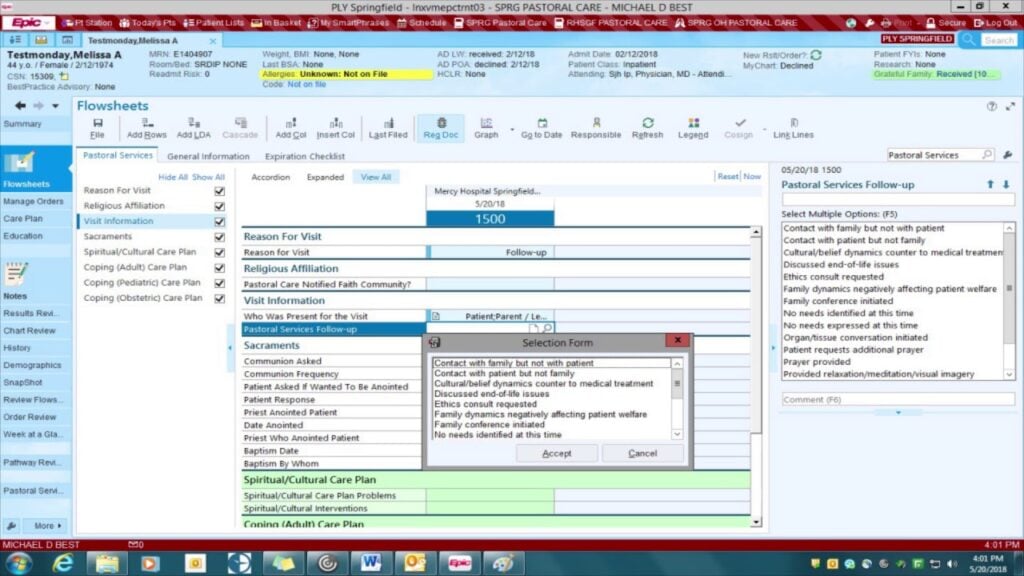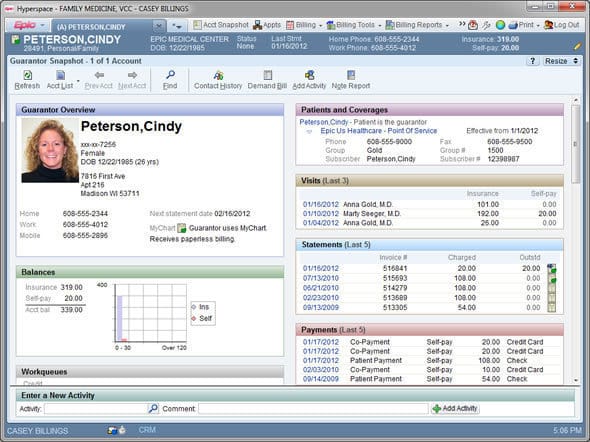With decades of experience in medical tech, I've spent years analyzing software platforms designed to improve healthcare delivery. Today, I bring that lens to a detailed EpicCare review. From functionality to user experience, I'll provide the insights you need to determine if this software fits your clinical environment. Stay tuned.

EpicCare EMR Software Overview
EpicCare EMR software serves as an electronic medical record platform that centralizes patient data and streamlines medical practice workflows. Healthcare providers, particularly in large hospitals and health systems, are its primary end users. The tool enhances patient care by offering real-time charting, decision support, and a user-friendly patient portal. EpicCare notably addresses the pain points of data fragmentation and inefficient appointment scheduling. Its standout features include customizable templates for patient charts, robust customer support, and a comprehensive patient portal.
Pros
- Customizability: EpicCare offers highly customizable templates for patient charts, giving clinicians the flexibility to adapt the system to specific healthcare settings.
- Support: Exceptional customer support is available, guiding users through the intricacies of EpicCare's extensive modules and functionalities.
- Patient Portal: MyChart, the patient portal, offers a robust set of features for patients to manage their medical history, treatment plans, and follow-ups, thus enhancing patient engagement.
Cons
- Learning Curve: EpicCare has a steep learning curve that can be intimidating for new end users, potentially affecting the speed of integration into medical practices.
- Pricing: The cost of implementing and maintaining EpicCare can be higher compared to other EMR systems, making it less accessible for smaller healthcare facilities.
- Complexity: The extensive array of features and modules can be overwhelming, leading to underutilization of the software's full potential.
Expert Opinion
After comparing EpicCare with other EMR software in terms of features, pricing, functionality, and support, it's clear that this software excels in robustness and scalability but falls short in ease of use and affordability. In my judgment, EpicCare outperforms in offering a comprehensive suite of modules from chart review to revenue cycle management. However, the learning curve and pricing may deter smaller healthcare organizations. It is best suited for large hospitals and health systems that require a wide array of functionalities and can afford the investment.
EpicCare: The Bottom Line
What sets EpicCare apart is its ability to offer a comprehensive, end-to-end solution for healthcare providers, from charting and workflows to a fully integrated patient portal. The software particularly excels in patient care features, such as real-time decision support and robust patient records management. Its patient portal, MyChart, is notably user-friendly and offers features like appointment scheduling and treatment plan overviews that aren't commonly found in other EMR software.
EpicCare Deep Dive
Product Specifications
- Patient Charting - Yes
- Appointment Scheduling - Yes
- Decision Support - Yes
- E-Prescribing - Yes
- Referral Management - Yes
- Patient Portal - Yes
- Custom Templates - Yes
- Voice Recognition - Yes
- Billing and Revenue Cycle Management - Yes
- Clinical Workflow Automation - Yes
- Document Management - Yes
- Reporting and Analytics - Yes
- Multi-Specialty Support - Yes
- Telemedicine - Yes
- HIPAA Compliance - Yes
- Lab Integration - Yes
- Imaging Integration - Yes
- Mobile Access - Yes
- Multi-Location Support - Yes
- Insurance Eligibility Verification - Yes
- Customizable Dashboards - Yes
- Patient Education Resources - Yes
- Prescription Renewal Request Management - Yes
- Care Plans and Treatment Plans - Yes
- Patient Follow-Ups - Yes
Feature Overview
- Patient Charting: EpicCare offers real-time patient charting that significantly cuts down documentation time for clinicians. Its dynamic templates adapt to the medical practice at hand.
- Appointment Scheduling: This feature efficiently manages both in-person and telemedicine appointments. It even sends automated reminders to both patients and providers.
- Decision Support: EpicCare provides critical data-driven insights in real-time, which assist clinicians in making accurate, timely clinical decisions.
- Custom Templates: Unlike many EMRs, EpicCare allows for highly customizable templates, giving clinicians the ability to mold the software to fit their specific needs.
- Patient Portal (MyChart): MyChart isn’t just a patient portal; it's a comprehensive patient engagement platform. It provides options for appointment scheduling, access to medical history, and treatment plans.
- Mobile Access: EpicCare is accessible via iPhones, giving providers the ability to stay connected even when they're on the move.
- Referral Management: The software simplifies the otherwise complex process of managing patient referrals, streamlining both inbound and outbound referrals.
- Clinical Workflow Automation: EpicCare automates routine tasks, enabling clinicians to focus on more complex tasks and improving the quality of patient care.
- Lab and Imaging Integration: EpicCare can seamlessly integrate with various lab and imaging systems, centralizing all patient data.
- Billing and Revenue Cycle Management: It offers an end-to-end solution for all financial aspects of a healthcare organization, from claim submission to payment tracking.

Standout Functionality
- Decision Support: EpicCare offers a higher level of real-time, data-driven clinical decision support than most other EMR systems.
- Custom Templates: The level of customization available for clinical templates is far beyond what most competitors offer, allowing for unique workflow tailoring.
- MyChart Patient Portal: This patient portal goes beyond the basics, providing comprehensive features like wellness tracking, which isn't commonly found in other EMRs.
Integrations
- Lab Systems: Direct integration with a range of lab systems.
- Imaging Systems: Integration with DICOM-compliant imaging systems.
- Third-Party Apps: EpicCare provides an API, allowing for extensive integration options with third-party applications.
Pricing
- Basic Plan: $350/user/month (min 5 seats) offers standard EMR functionalities.
- Advanced Plan: $500/user/month, includes advanced modules and customer support (billed annually).
Note: Additional costs may include a one-time setup fee.
Ease of Use
While EpicCare provides a myriad of features, its interface isn’t the most user-friendly initially. The onboarding process can be cumbersome, and the learning curve is steep. The platform itself is extensive, so navigation may require some time to master. Some user reviews also indicate that certain modules could be more intuitive. Nonetheless, the software provides tutorials and customer support to help end users acclimate.
Customer Support
EpicCare offers a variety of customer support channels, including a comprehensive FAQ section, webinars, and live chat. The company also provides tutorials and dedicated customer support representatives. However, customers often mention that the response time can be less than desirable. Many end users report feeling a bit left to their own devices, especially when grappling with the more complex modules.
EpicCare Use Case
Who would be a good fit for EpicCare?
EpicCare excels in large hospital and healthcare systems. It offers a range of features that are well-suited for multi-specialty medical practices. The software thrives in environments that have IT support and staff trained to manage complex EMR systems. The most loyal users often work in large healthcare facilities that require comprehensive decision support, advanced integration capabilities, and a myriad of features to manage patient information.
Who would be a bad fit for EpicCare?
Small healthcare providers with a limited IT budget and staff may find EpicCare overwhelming and cost-prohibitive. Solo practitioners and small clinics often report the software as overkill for their simpler needs. Additionally, healthcare settings that require quick onboarding and ease of use may find EpicCare’s learning curve steep and its system somewhat cumbersome.
EpicCare FAQs
What is EpicCare's most standout feature?
EpicCare offers advanced decision support, providing real-time, data-driven insights for clinicians.
Is EpicCare HIPAA compliant?
Yes, EpicCare complies with HIPAA regulations to ensure patient data remains secure.
Does EpicCare offer telemedicine features?
Yes, it supports telemedicine appointments and can integrate this feature into the overall patient care strategy.
What type of practices is EpicCare best suited for?
It works particularly well in large healthcare organizations that require a wide range of functionalities.
Does EpicCare offer mobile access?
Yes, providers can access EpicCare on their iPhones.
How does EpicCare handle integrations?
EpicCare offers an API and supports multiple third-party integrations.
What are the customer support options?
EpicCare provides webinars, live chat, and dedicated customer support representatives.
Is there a steep learning curve?
Yes, EpicCare requires some time to master and is best suited for organizations with in-house IT support.
Alternatives to EpicCare
- Cerner PowerChart: Known for its robust analytics tools.
- Allscripts: Stands out for ease of use and quicker implementation times.
- athenahealth: Best for small to midsize healthcare providers looking for cloud-based solutions.
Check more options in this list of the best practice management software to guide you.
EpicCare Company Overview & History
Epic Systems Corporation, the creator of EpicCare, specializes in electronic health records, and other health software solutions. The company services large healthcare organizations and is privately owned. Its headquarters are located in Verona, Wisconsin. Notable members include founder and CEO Judy Faulkner. The company’s mission focuses on improving healthcare through innovation. EpicCare itself has been a cornerstone in the EMR industry for decades, boasting several milestones including early adoption of cloud-based solutions and comprehensive patient portals.
Summary
This review provides an extensive look at EpicCare, outlining its functionalities, ease of use, and customer support. While the software is feature-rich, its complexity and pricing make it better suited for large healthcare organizations than smaller practices. Feel free to comment below and share your experiences with EpicCare. For more insights into other EMR software, visit our medical tools page.

